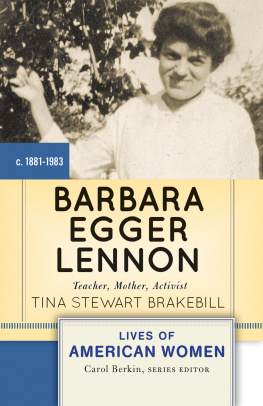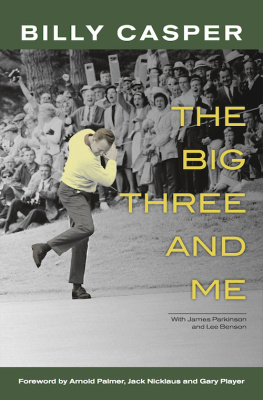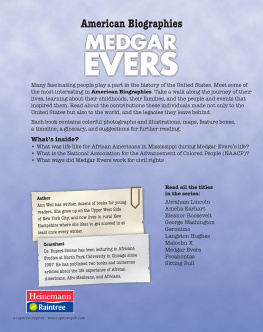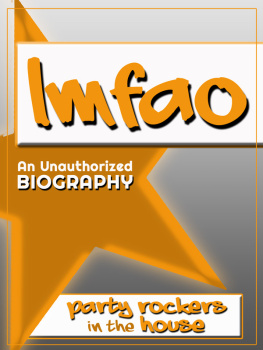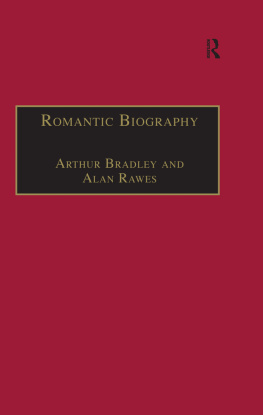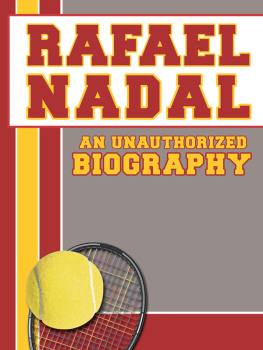1999
The University of North Carolina Press
All rights reserved
Designed by Richard Hendel
Set in Monotype Garamond
by Tseng Information Systems, Inc.
The paper in this book meets the guidelines for
permanence and durability of the Committee on
Production Guidelines for Book Longevity of the
Council on Library Resources.
Library of Congress Cataloging-in-Publication Data
Casper, Scott E.
Constructing American lives: biography and culture in
nineteenth-century America / Scott E. Casper
p. cm.
Originally presented as the author's thesis (Ph.D.)
Yale University.
Includes bibliographical references and index.
ISBN 0-8078-2462-3 (cloth: alk. paper).
ISBN 0-8078-4765-8 (pbk.: alk. paper)
1. Biography as a literary form. 2. United StatesBiographyHistory and criticism. 3. United StatesSocial life and customs19th century. I. Title.
CT34.U6C37 1999
808'.06692dc2I98-22056
CIP
03 02 01 00 9954321
The publication of this book has been aided by generous support from the L. J. Skaggs and Mary C. Skaggs Foundation.
ACKNOWLEDGMENTS
This book is no more self-made than its author, and it is a pleasure to thank those who have helped shape both. Richard Oberdorfer first inspired me to envision history as a profession; he and many other teachers at Norfolk Academy set standards for writing and teaching that remain with me. At Princeton, Lee Clark Mitchell and James McPherson encouraged me to probe the connections and test the boundaries between history, literature, and culture.
Constructing American Lives began as a dissertation in Yales American Studies Program, where my director Richard Brodhead offered unfailing support and advice that made all the difference. I benefited also from readings by Bryan Wolf, David Brion Davis, and Nancy Cott. Jon Butler, who read the dissertation with a humanely critical eye, taught me the value of ruthless revision. Every graduate student should have a teacher like Ann Fabian, whose friendship and intellectual vitality and imagination I continue to cherish. Many friends in graduate school provided advice, citations, and camaraderie; I am particularly grateful to Jonathan Cowden, Leah Dilworth, Karin Gedge, Stephen and Barbara Lassonde, Stephen Rachman, Kristin Robinson, Christopher Shannon, Glenn Wallach, Elizabeth White, and Susan Williams. Christopher Grasso has read every draft of every part of this project ever since we began our dissertations. Chris has been its toughest, most constructive critic at every level, from large arguments to choices of words.
My debt to the American Antiquarian Society is similarly large. As a research fellow at AAS in 1990-91 and in many visits since, I became acquainted with the history of the bookand with the most remarkable research staff I have been privileged to know. Joanne Chaison, research librarian extraordinaire, has shared the excitement of my archival discoveries, many of which were as much hers as mine. Marie Lamoureux, Dennis Laurie, Tom Knoles, and many others located obscure books, articles, and manuscripts; they often brought materials to my attention that I would not have thought to look for. The other side of AAS is its unparalleled community of visiting researchers, whose stay and scholarship John Hench facilitates with unflappable hospitality. I have benefited immeasurably from conversations with and perceptive readings by a number of scholars whom I first met at AAS, notably Norma Basch, Steve Bullock, William Gilmore-Lehne, Jeffrey Groves, Mary Kelley, Carolyn Lawes, Barbara and Ron Meldrum, Rosalind Remer, Amy Thomas, Michael Winship, and Ronald and Mary Zboray. Thanks also to Richard Brown and Charles Monaghan for sharing useful citations.
As I presented portions of this project at conferences and seminars, numerous commentators, fellow panelists, and listeners offered ideas, citations, and advice. I would like to thank them all. In particular, I was fortunate to participate in a 1993 National Endowment for the Humanities Summer Institute at Vassar College, where Daniel Peck, Wayne Franklin, Margaretta Lovell, Angela Miller, Nancy Cook, and many other scholars responded generously to a presentation about the project as a whole.
Numerous other libraries and archives have made research possible and pleasant. The reference staffs of Sterling Memorial Library, the Beinecke Library, and Manuscripts and Archives at Yale assisted me in finding many sources easily and efficiently. The Houghton Library at Harvard University, and especially curator of manuscripts Leslie Morris, welcomed me into its collection of literary and publishing manuscripts, including uncatalogued material. I also enjoyed working in the Alderman Library and Special Collections at the University of Virginia, the Connecticut Historical Society, the Watkinson Library at Trinity College, Hartford (where Alesandra Schmidt helped me get through the Charles Dudley Warner collection at breakneck pace), the New York Public Library, the Southern Historical Collection at the University of North Carolina, Chapel Hill, the Huntington Library, and the Library of Congress. For permissions to quote from materials in their collections, I am grateful to the following: the American Antiquarian Society; the Boston Public Library; the Connecticut Historical Society, Hartford; the Houghton Library, Harvard University; the Huntington Library; the Maryland Historical Society; the New-York Historical Society; Special Collections and Archives, University of Kentucky; the Southern Historical Collection, Wilson Library, University of North Carolina at Chapel Hill; Manuscripts Division, South Caroliniana Library, University of South Carolina; Special Collections, Alderman Library, University of Virginia; the Watkinson Library, Trinity College; and the Yale Collection of American Literature, Beinecke Rare Book and Manuscript Library, Yale University. Earlier versions of portions of this book previously appeared in American Literary History, the Journal of Womens History, Nineteenth-Century Prose, and in Reading Books: Essays on the Material Text and Literature in America, edited by Michele Moylan and Lane Stiles.
Without financial assistance, this book (and my graduate education) would have been only a dream unfulfilled. My research was generously supported by a Mellon Fellowship in the Humanities from the Woodrow Wilson Foundation, a University Fellowship at Yale, a Kate B. and Hall J. Peterson Fellowship at AAS, the Stanley J. Kahrl Fellowship in Literary Manuscripts at the Houghton Library, and a Junior Faculty Research Award from the University of Nevada, Reno.
The University of Nevada, Reno, has sustained this project in countless ways over the past six years. The UNR Libraries have been superb, answering many questions, tracking down the obscurest interlibrary loan requests, and purchasing reference sources that assisted me enormously. Millie Syring and Mike Simons deserve special thanks for enabling me to find elusive materials. Scott Lupo provided valuable research assistance. My deepest gratitude is to the Department of History, unusual among history departments in its deliberate emphasis on cultural history. This book is richer for my conversations with all of my colleagues, notably Martha Hildreth, Bruce Moran, Eric Rauchway, and Hugh Shapiro. Several deserve particular thanks: department chair Jerome Edwards, for important moral and administrative support for my research and writing; Jen Huntley-Smith, for reading several chapters perceptively and sharing my enthusiasm for book history; Elizabeth Raymond, for sage advice about this books organization and ideas and for a splash of cold water when speculation outpaced evidence; and Dennis Dworkin, for always encouraging me to imagine the broader implications of my workand to address them clearly and directly. Dennis and his family, Amelia Currier and Sam Dworkin, are also the warmest friends I could have wished for in my adopted western home.


